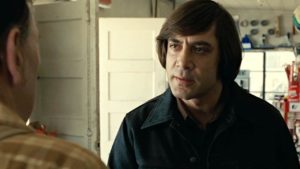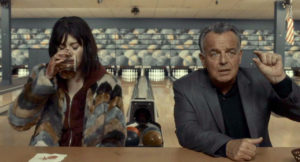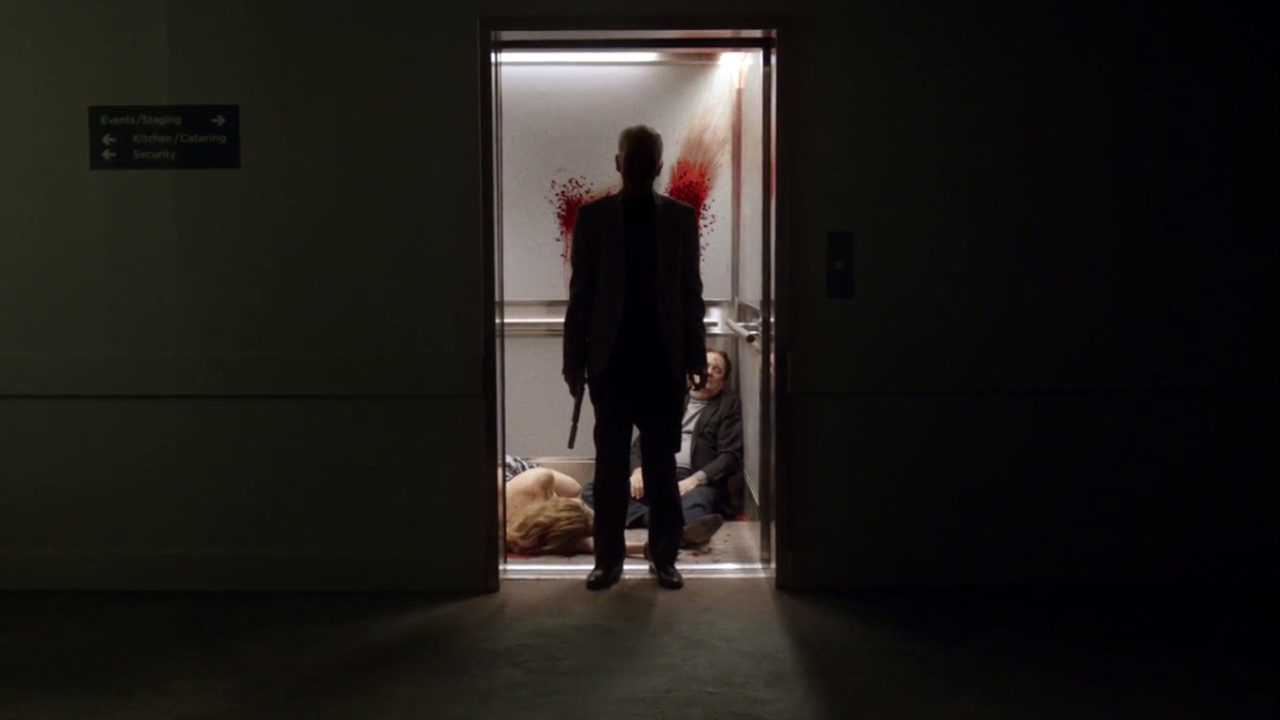A briefcase full of money. A failed extortion attempt. Ordinary folk getting more than they bargained for when submerging themselves in criminality. An inciting incident leading to a cacophony of violence and misunderstanding. That’s the Coen Brothers way, whether serious, like No Country for Old Men, or absurd, such as The Big Lebowski or Burn After Reading. Their acclaimed 1996 film, Fargo, falls squarely in the middle of the spectrum of comedy and drama. In 2014 it became Noah Hawley’s burden to create a television spin-off to the film, a task I was sure would result in failure. Yet it became of the best shows of the decade and showcased just how well Hawley understood the true nature of the Coen Brothers’ style, not only by producing a show worthy of their oeuvre but also by personifying it in a character who would become one of television’s greatest villains.
 Lorne Malvo is a contract killer, but that job description doesn’t do him justice. While on the surface he may take orders, in truth he’s in control. He uses his life of freewheeling crime as a way to travel across the country and interact with the common man, setting them on a dark path for his own amusement. He’s also in this line of work because of his philosophy, bringing him into contact with those he can manipulate and use to prove his outlook on life. He has no allegiances other than to anarchy. My favourite Coen Brothers films see an average Joe get involved with crime, almost on a whim, only for their life to spiral out of control, and Malvo is the character who gives them that initial push into darkness. Not only that but he personifies the chain of chaos and consequences that follows too.
Lorne Malvo is a contract killer, but that job description doesn’t do him justice. While on the surface he may take orders, in truth he’s in control. He uses his life of freewheeling crime as a way to travel across the country and interact with the common man, setting them on a dark path for his own amusement. He’s also in this line of work because of his philosophy, bringing him into contact with those he can manipulate and use to prove his outlook on life. He has no allegiances other than to anarchy. My favourite Coen Brothers films see an average Joe get involved with crime, almost on a whim, only for their life to spiral out of control, and Malvo is the character who gives them that initial push into darkness. Not only that but he personifies the chain of chaos and consequences that follows too.
Lorne Malvo pushes Lester Nygaard in a direction and watches his life implode, along with the audience. He gets off on it, always listening to taped phone calls from those he incites violence within. One interaction with Lester leads to dozens of deaths across multiple states, most by Malvo’s hand, showing the dark consequences rippling outwards. And when the two finally meet again, Lorne offers “is this what you want?” to Lester as both a warning and an invitation. Lester, with newfound arrogance, replies in the affirmative and Malvo drops everything – including a long con he’s been developing for months – just to upend somebody’s world for his own amusement and demonstrate his ideology at play.
 Malvo not only embodies the storytelling style of Hawley, and the Coen Brothers before him, but the storytellers themselves too. In an almost meta way, Malvo is the author of this narrative. The showrunner. Each tape in his collection being an example of a Fargo story he has written. Malvo sets everything in motion and then returns to conclude the narrative, for the joy of watching his story unfold and the point he feels it proves. This not only makes Malvo the perfect character for Fargo, and any Coen Brothers series in general, but also one of the greatest villains on television.
Malvo not only embodies the storytelling style of Hawley, and the Coen Brothers before him, but the storytellers themselves too. In an almost meta way, Malvo is the author of this narrative. The showrunner. Each tape in his collection being an example of a Fargo story he has written. Malvo sets everything in motion and then returns to conclude the narrative, for the joy of watching his story unfold and the point he feels it proves. This not only makes Malvo the perfect character for Fargo, and any Coen Brothers series in general, but also one of the greatest villains on television.
While Fargo’s first season very much plays like a remixed version of the film, it also takes inspiration from other work by the Coen Brothers. At times Lorne Malvo feels like Anton Chigurh from No Country for Old Men, if Chigurh had a sense of humour that is. Hawley is certainly borrowing from the best, with Chigurh being one of cinema’s greatest antagonists. Never has a bad haircut and a cattle gun been so scary. Both characters represent an unrelenting, unstoppable, and almost inhuman force of pure evil.
 One of my favourite scenes from No County for Old Men is Chigurh stopping off for gas and asking the attendant a series of bizarre questions to unnerve and threaten the guy, ultimately flipping a coin to decide his fate. There are a couple of scenes in which Malvo channels Chigurh in the way, slicing through social etiquette in order to disturb. Unlike Chigurh however, Malvo does so in a way that maintains a twisted form of humour and charisma in a way only Billy Bob Thornton can pull off. He’s Chigurh through the Fargo filter.
One of my favourite scenes from No County for Old Men is Chigurh stopping off for gas and asking the attendant a series of bizarre questions to unnerve and threaten the guy, ultimately flipping a coin to decide his fate. There are a couple of scenes in which Malvo channels Chigurh in the way, slicing through social etiquette in order to disturb. Unlike Chigurh however, Malvo does so in a way that maintains a twisted form of humour and charisma in a way only Billy Bob Thornton can pull off. He’s Chigurh through the Fargo filter.
Chigurh and Malvo not only seem unstoppable but also, vitally, unknowable by those who come into contact with them. The goodhearted, plucky cops chasing Malvo are just that: good. In a way they’re too pure to truly understand a man like Malvo. This is a theme present throughout the Coen Brothers’ filmography and fits perfectly in the world of Fargo. In the film, we get that fantastic scene of Marge driving the apprehended Gaear back to the station while she tries to work out why all these events have occurred. She’s baffled how men can be so evil just for some money, and that so much death and destruction has come of it. The same is true for Tommy Lee Jones’ sheriff in No Country for Old Men, a film in which the villain wins and the surviving protagonist is left questioning how a man of such evil can exist in a world he thought he knew so well.
 Malvo is such a force of evil and manipulation that it begs the question of whether he is truly human. It does feel like Hawley was playing it safe in the first season of the show when it came to the supernatural, and future seasons expanded the show’s scope to include UFOs, quasi-religious metaphysical bowling alleys, and ghosts. Season one is the only season without a clearly supernatural element, but Malvo could be considered as such. He is someone who represents an idea more than he is a human character. He’s a malevolent entity, as the name Malvo may suggest.
Malvo is such a force of evil and manipulation that it begs the question of whether he is truly human. It does feel like Hawley was playing it safe in the first season of the show when it came to the supernatural, and future seasons expanded the show’s scope to include UFOs, quasi-religious metaphysical bowling alleys, and ghosts. Season one is the only season without a clearly supernatural element, but Malvo could be considered as such. He is someone who represents an idea more than he is a human character. He’s a malevolent entity, as the name Malvo may suggest.
“I haven’t had pie like this since the Garden of Eden,” he says in the penultimate episode, clearly alluding to the temptation of Eve. In that same episode we see blood splatter behind him form the shape of red, demonic wings. He makes Faustian bargains with his victims and seemingly even has the ability to disappear at will. In one subplot he twists scripture and a character’s religious beliefs to manipulate them. The comparisons to the Devil are clear and intentional but that almost feels too simple. Is he superhuman or just a man? We don’t have an answer and we shouldn’t. It’s interpretable in different ways. To me he’s both. Schrodinger’s contract killer. If he wasn’t to begin with, his ideology has twisted him into something inhuman. He sure takes a lot of bullets to kill and, to be honest, I’d be fine with a resurrection in a future season.
 Lorne Malvo’s philosophy is quite simple. He sees humanity for nothing but its base instincts. That all men are beasts: predators or prey. He takes joy in unleashing the beasts hidden within the weak and feeble, contorting them to his world view, before feeding on them in turn. Malvo keeps audio records of his past deeds, listening to the people he’s manipulated unravel. This is the way he feeds off his prey. He respects his fellow predators too, going so far to free hitman Mr Wrench because he came close to killing him. Fargo continues this ‘villains as predatory animals’ theme in the third season with V.M. Varga, a wolf baring rotten teeth and a Brummie accent. The opening sequence to one of those episodes even features a recording of Peter and the Wolf, in which each character is represented by a different animal and instrument. And who narrates that scene? Lorne Malvo.
Lorne Malvo’s philosophy is quite simple. He sees humanity for nothing but its base instincts. That all men are beasts: predators or prey. He takes joy in unleashing the beasts hidden within the weak and feeble, contorting them to his world view, before feeding on them in turn. Malvo keeps audio records of his past deeds, listening to the people he’s manipulated unravel. This is the way he feeds off his prey. He respects his fellow predators too, going so far to free hitman Mr Wrench because he came close to killing him. Fargo continues this ‘villains as predatory animals’ theme in the third season with V.M. Varga, a wolf baring rotten teeth and a Brummie accent. The opening sequence to one of those episodes even features a recording of Peter and the Wolf, in which each character is represented by a different animal and instrument. And who narrates that scene? Lorne Malvo.
Across ten episodes, the season has built up Malvo as an unstoppable threat – both a demon and a wild animal – yet his death is satisfying on both surface and thematic levels. Gus Grimly, a police-officer-turned-mailman constantly mistaken for animal control, is the one to put down the animal that is Lorne Malvo. In the past, Gus was weak prey for Malvo and easily manipulated, but he solved a riddle posed by the villain and the answer reveals what he must do: become a predator. Gus sees what Malvo truly is, a beast, and puts him down like one. Recovering from a bear trap wound and flanked by a mysterious wolf prophesising Gus’ transformation, Malvo is shot five times before he has a chance to make a move.
 Lorne Malvo is dead – although, granted, it takes a while and he briefly shudders back to life to bare his teeth/smile at his killer – but does he actually win? His dying smile says it all. In way Malvo manipulated Gus into betraying his good nature and becoming a beast himself, ultimately making the man who just wanted a peaceful life as a postman murder him. He may die and, on the surface, good may triumph but, in truth, the most terrifying thing about this is, even with a bear trap on his leg and five bullets in his body, Lorne Malvo wins and his warped worldview lives on, confirming his legacy as one of television’s greatest villains.
Lorne Malvo is dead – although, granted, it takes a while and he briefly shudders back to life to bare his teeth/smile at his killer – but does he actually win? His dying smile says it all. In way Malvo manipulated Gus into betraying his good nature and becoming a beast himself, ultimately making the man who just wanted a peaceful life as a postman murder him. He may die and, on the surface, good may triumph but, in truth, the most terrifying thing about this is, even with a bear trap on his leg and five bullets in his body, Lorne Malvo wins and his warped worldview lives on, confirming his legacy as one of television’s greatest villains.
What are your thoughts on Lorne Malvo? Who do you consider to be television’s greatest villain? Let me know in the comments and be sure to geek out with me about TV, movies and video-games on Twitter @kylebrrtt.








